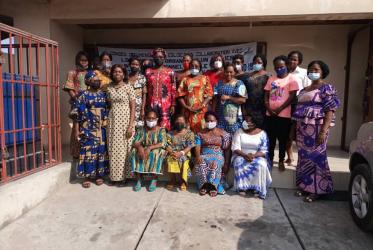Protestant Methodist Church of Benin
(Eglise protestante méthodiste du Benin, EPMB)
The church was founded in 1843 by Thomas Birch Freeman of the Methodist Missionary Society of London. Freeman, the son of a freed slave, also undertook pioneering missionary work in Ghana and western Nigeria. The church maintains its historical links with the Methodist Church of Great Britain. Administratively the Methodist Church of Benin is organized in 15 regional synods. It covers the whole of the territory of Benin from the southern coastline to the Niger border in the north. The church is recognized as playing an active role in the life of the nation: it is involved in agricultural projects, in hospital and prison chaplaincy, in service to refugees; through its strong Union of Methodist Women it is directly concerned with the training of young girls and young women in rural areas, enabling them to have a basic education and to learn income-generating skills.
The Benin Methodist Church plays a leading role in the National Committee to Combat AIDS, but also, at local church level and through the women's union, it works to promote AIDS awareness and prevention.
Ministerial training is a pivotal part of the total mission of the Methodist Church through the Protestant University of West Africa (Université Protestante de l'Afrique de l'Ouest - UPAO). Formerly the Institute of Protestant Theology, this centre which traditionally trains candidates for the pastoral ministry not only from Benin but also from Côte d'Ivoire (Ivory Coast), Togo, Cameroon, Senegal and Gabon, acquired university status in 2004. The training of evangelists is undertaken at the Bible school jointly with the Evangelical Presbyterian Church of Togo. The Methodist Church is involved in the study of Islam and in dialogue with the Muslim community and other religions.




